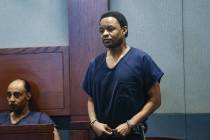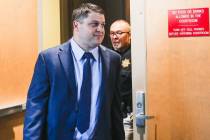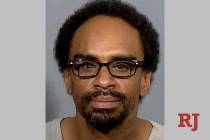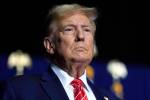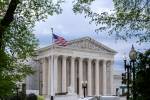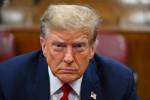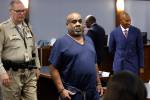Desai’s lawyers argue competency as Supreme Court tosses out racketeering charge
Lawyers for Dr. Dipak Desai want to suspend his criminal case in the hepatitis C outbreak so legal proceedings can be reopened to determine whether he is competent to stand trial.
His lead defense lawyer, Richard Wright, said in court papers late Friday that a recent psychiatric evaluation shows a "bona fide doubt exists as to Desai's present ability to assist counsel at trial."
This comes as the Nevada Supreme Court on Friday tossed out the racketeering charge that formed the basis of a 28-count criminal indictment against Desai and two nurse anesthetists.
In a five-page order, a three-member high court panel ordered District Judge Valerie Adair to grant a defense writ challenging the sufficiency of the racketeering count.
The panel also ordered Adair to allow Clark County prosecutors to file an amended indictment clearing up the language in 14 charges tied to the criminal neglect and mistreatment of seven patients infected with the deadly hepatitis virus at Desai's clinic in 2007.
Desai's lawyers first challenged his mental competency shortly after his June 2010 indictment, but prosecutors contended he was faking his impairments from two strokes to obstruct the criminal case.
Last year, after a six-month evaluation at Nevada's secure mental hospital in Sparks, medical experts concluded the former gastroenterologist was exaggerating the effects of the strokes. A judge later declared Desai competent to stand trial.
In his motion to reopen the competency proceedings, Wright attached the Nov. 1 results of the evaluation Reno psychiatrist Thomas Bittker performed on Desai.
"Dr. Desai unfortunately falls short of a number of key abilities necessary to be competent to stand trial," Bittker wrote in his nine-page analysis. "Specifically, he has only the most superficial awareness of the players in the courtroom process.
"He cannot recall events sufficient to aid in his defense, he lacks sufficient cognitive flexibility to fully integrate the trial proceedings, and his speech impairments are sufficient to cause him great challenge in expressing his thoughts to his attorney.
"All of these deficits conspire to undermine his ability to aid and assist counsel sufficiently to allow him to participate effectively in his own defense."
After more than two years of delays, mainly because of the competency issue, Desai, 63, and nurse anesthetist Ronald Lakeman, 65, are to stand trial before Adair on April 22. The other nurse charged in the case, Keith Mathahs, 76, pleaded guilty earlier this month and agreed to testify against the other two defendants.
In ordering the racketeering charge dismissed, the Supreme Court panel wrote, "We conclude that extraordinary relief is warranted because the challenged allegations are not sufficiently plain, concise and definite."
The panel said the racketeering count, which alleges the defendants carried on a pattern of criminal activity that led to the hepatitis infections, was "inadequately pleaded" and failed to allege the essential elements of the criminal activity.
Desai's lawyers argued the language was so vague it violated his constitutional due process rights and made it difficult to mount any kind of meaningful defense.
Chief Deputy District Attorney Mike Staudaher, the lead prosecutor in the high-profile case, declined comment Monday on the order and would not say whether he would seek to refile the racketeering charge.
He also declined comment on the defense's latest push to challenge Desai's competency.
The high court's opinion does not affect a series of other charges against Desai and Lakeman in the sweeping indictment, including theft, insurance fraud and obtaining money under false pretenses. The murder charge, which was filed separately earlier this year, also is not affected.
Last week, Adair denied a defense writ to dismiss the murder charge against Desai but held off ruling on whether to drop the case against Lakeman.
Adair set a Jan. 3 hearing to determine whether Lakeman should stand trial on allegations of a conspiracy that led to the death of Rodolfo Meana, a victim of the 2007 outbreak.
Desai, who has given up his medical license, and Lakeman are facing second-degree murder charges stemming from Meana's death.
Defense lawyers argued the murder indictment failed to directly tie them to Meana's death.
Desai performed the colonoscopy on Meana that led to his hepatitis infection, and Mathahs participated in the procedure.
Lakeman did not participate, but prosecutors argued he was just as culpable in Meana's death under the theory of the murder charge, which alleges all three defendants were part of the conspiracy that endangered the lives of Desai's patients.
The indictment accuses Desai and the nurse anesthetists of unlawfully "introducing the hepatitis C virus" into Meana's body during the colonoscopy.
Meana, 77, died in April of complications from hepatitis C in his native Philippines.
His infection was among seven that health officials genetically linked to Desai's main clinic, the Endoscopy Center of Southern Nevada. Health officials have said dozens more cases were "possibly linked" to the clinic.
Officials concluded Meana and five other patients contracted hepatitis C through unsafe injection practices on Sept. 21, 2007. Another patient was infected on July 25, 2007.
Contact reporter Jeff German at jgerman@reviewjournal.com or 702-380-8135.













